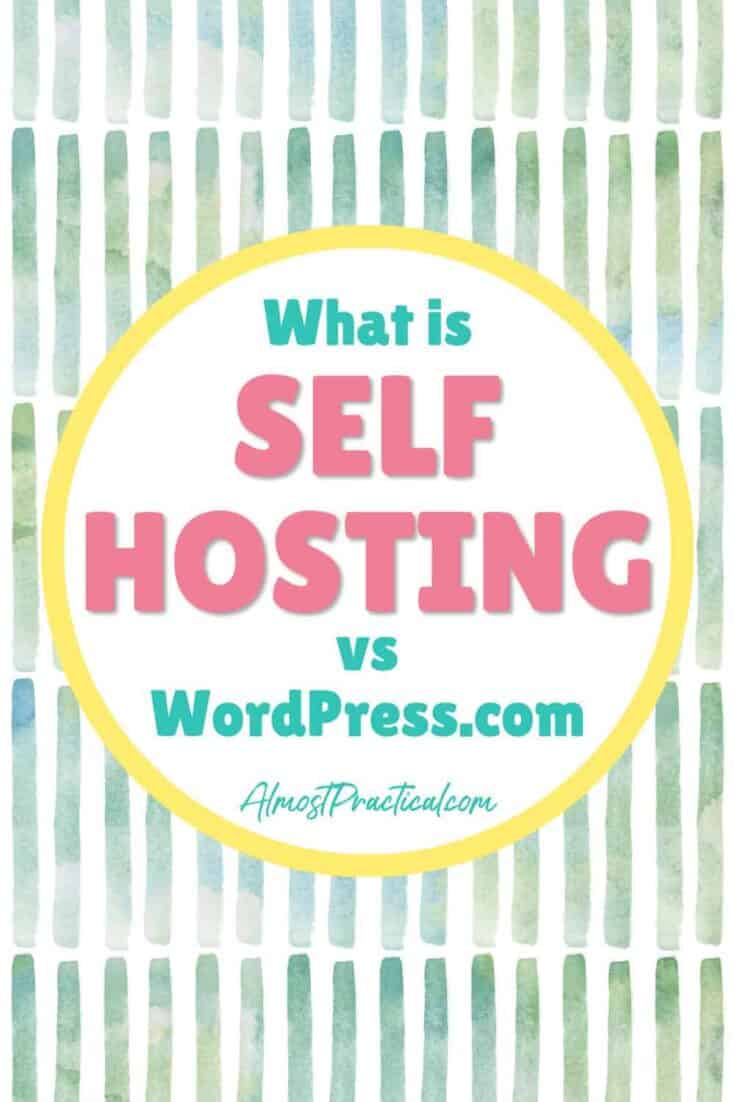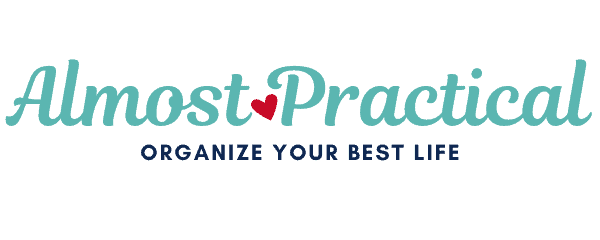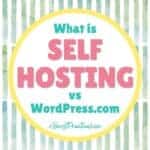WordPress: What is Self Hosting vs. WordPress.com?
This post may contain affiliate links which means I make a commission if you shop through my links.
Disclosure Policy
If you are new to blogging, you are probably wondering about self hosted WordPress vs. WordPress.com and how they are different.
Though they are commonly confused, there is a big difference that is important to understand.
Let me tell you a story.
Recently, two different people that I know started blogs on self hosted WordPress.
They then came to me with questions, so I asked them to log into their WordPress dashboards.
Guess where they BOTH went to log in?
Yup.
WordPress dot com.
But here is the thing – both of their blogs were powered by self hosted WordPress, which meant that they could not log in at WordPress.com.
You see, if you have self hosted WordPress then your blog is not on WordPress.com at all.
One has nothing to do with the other – they are completely different things.

Why You MUST Understand the Difference
If you are planning to start a blog on WordPress, then you must understand the difference BEFORE you start blogging.
You don’t want to start off on either one by mistake and find out later that you made the wrong choice.
Doing your homework upfront will save you a headache in the long run.
Of course, there are other blogging platforms out there besides WordPress.
But today I am talking about the two different WordPress products that are easily confused: Self hosted WordPress vs. WordPress.com.
Related: Blogging for Beginners FAQ
What is Self Hosting?
To have a website or a blog you need to have a host.
A host is basically a computer somewhere on which your website lives.
This computer is on 24/7 and has enough resources to handle the volume of web traffic that stops by your site.
This host is not YOUR computer but rather a server owned by a hosting company or by a website building service that includes hosting.
What Does Self Hosted WordPress Mean?
Self hosted WordPress is called “self hosted” because you – as the website owner – purchase a WordPress hosting plan from a hosting company.
You will find many opinions on the best WordPress hosting options out there – and that is a whole discussion on it’s own.
I will tell you, though, that I use BigScoots managed WordPress hosting and really like it. (you can read about the reasons why I like BigScoots here.)
Self Hosted WordPress Is Not a Blog Host
A lot of the confusion of WordPress.org vs WordPress.com issue is due to a misconception that self hosted WordPress (also known as WordPress.org) is also a host, which it is not.
With self hosted WordPress you install the WordPress software on your hosting account.
Many blog hosts make this WordPress software available to you.
Some hosts even install it for you or make it an easy one click install.
Once you have WordPress installed on your hosting account, you then install a WordPress framework and/or theme.
I use the Kadence Framework on my blog and a theme from Restored316.
Next you add the WordPress plugins of your choice, set them up, and start blogging.
The Benefits of Self Hosted WordPress vs WordPress.com
You will hear people say that self-hosted WordPress is the way to go.
This is because self-hosted WordPress is
- extremely flexible because of the plugin functionality
- and it is portable – meaning that you can change hosts or hosting plans at your discretion
Basically, you have complete control over your website.
You log into your website directly from the back end.
You do not go to WordPress dot com – the folks there have nothing to do with your website.
Your Responsibilities with Self Hosted WordPress
The complete control that you get with self hosted WordPress comes with a good bit of responsibility.
Think of it as owning your own home vs renting an apartment.
When you own your own home you have great flexibility.
You can paint it, hang pictures, plant a garden – whatever you want.
You can even sell and move.
However, it is your responsibility to maintain the house, fix the plumbing, mow the lawn, and rake the leaves.
If you don’t know how to do the maintenance – you need to hire someone.
And if you don’t maintain it, the house falls apart.
Such is the same with a self hosted WordPress blog or website.
You are responsible for maintaining your website.
When there are updates to your themes or plugins – you need to install them.
If something doesn’t work, you need to figure out how to fix it.
The problem may originate from your host, a plugin, or your theme.
But you have to do the troubleshooting.
Or hire someone to do it.
If you want the benefits of self hosted WordPress without so much of the hassle, you may want to try something called managed WordPress hosting (this is still self hosted WordPress).
I use a hosting company called BigScoots for this and have been very happy with it.
What is WordPress.com?
An alternative to self hosted WordPress is WordPress.com.
WordPress.com is a managed WordPress platform.
Basically, you sign up for an account, pick a theme, and you are ready to go.
It’s an all in one platform that includes hosting – and it even has a free level.
You are probably wondering why even bother with self hosted WordPress if WordPress.com has everything rolled into one.
The problem is that WordPress.com has many limitations that can cripple your plans for your blogging business.
Benefits of WordPress.com
The good thing about WordPress.com is that it is low maintenance.
They take care of updates, security, and backups.
All you need to do is show up and add content.
They also have different plans to choose from.
You can start off at with the free plan – and they give you a domain that is “yourdomain dot wordpress dot com”. (But you can purchase your own domain and have that redirected.)
Then you can upgrade to a paid plan as your traffic grows.
Restrictions of WordPress.com
While maintenance free may sound attractive, there are limitations.
Being on self hosted WordPress is like owning a home, WordPress dot com is more like renting an apartment.
Ads and Ad Restrictions
Pay close attention here!
On the free level, WordPress dot com retains the right to display ads on your website.
Any money generated through these ads goes to WordPress.com.
Once you upgrade to a paid plan, the ads go away – but you cannot display advertising from Google Adsense or other ad networks.
You are restricted to using their WordAds network.
WordPress dot com does allow affiliate links and sponsored posts – but it is up to their discretion whether you are violating their terms of service.
And that is more than a little scary.
If they decide that you are not in compliance, then you have to terminate that income stream or risk having your site shut down.
No Plugins Allowed
On WordPress.com you cannot add your own plugins.
This takes away a lot of the flexibility that self hosted WordPress offers.
However, if you work within these limitations, you don’t have to spend time with plugins at all.
This is why some people prefer self hosted WordPress.org vs WordPress.com.
Portability
To export your site from WordPress.com to self hosted WordPress down the road, you will get a series of xml files to use.
However, WordPress.com does offer a “done for you” export service that might be well worth the investment.
Comparison of WordPress.org vs WordPress.com
This page at WordPress.com actually does a nice job of comparing WordPress.org vs WordPress.com.
I encourage you to do the research and educate yourself on which one (or even a different platform altogether) is right for you.
Self hosted WordPress offers greater flexibility and functionality but that comes with greater responsibility.
WordPress.com does most of the back end maintenance for you but that comes with restrictions.
Which One Will You Choose?
The platform that you choose depends a lot on your blogging goals.
WordPress.com may work well for a personal blog or a static type site.
But if you plan to make money blogging through affiliate marketing, ads, sponsored posts, and selling your own products then you will probably appreciate the flexibility of self hosting.
Leave a comment below and tell us about your experience with WordPress.org vs. WordPress.com and why you chose what you did.
Happy blogging!







